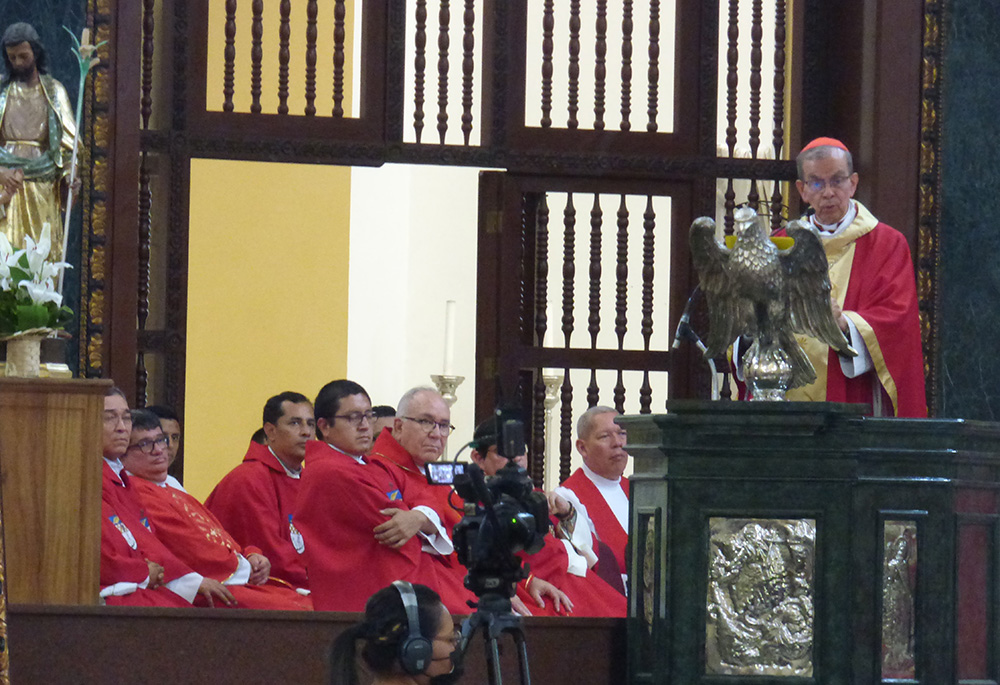
Salvadoran Cardinal Gregorio Rosa Chávez speaks during a homily March 24 at the Cathedral of San Salvador, El Salvador, for the feast of St. Oscar Romero. (NCR photo/Rhina Guidos)
Days before El Salvador marked the first anniversary of a controversial law suspending due process rights as part of a supposed crackdown on gang activity, a number of Catholic priests, along with a cardinal, lambasted the country's bishops for not speaking out more forcefully on behalf of tens of thousands of people who are now being held indefinitely.
"We demand that the government, the Salvadoran state, the prosecutor's office and all the responsible institutions, release those unjustly captured [by] the 'state of exception,' " said Fr. Juan Vicente Chopin in a March 24 homily. He was referring to the emergency measures that have allowed authorities, since March 27 of last year, the right to detain indefinitely anyone suspected of being a gang member, or have affiliations with them.
Chopin made the denunciation during a Mass to mark the feast of St. Oscar Romero at the altar where the Salvadoran bishop was slain on March 24, 1980, a day after denouncing the then-government's human rights abuses in the lead up to the Salvadoran civil war. Chopin called on prelates to follow the example of Romero and "speak out clearly in favor of the victims."
Hours later, the country's top churchman, Cardinal Gregorio Rosa Chávez, also celebrating a Mass for the feast of St. Romero at the Cathedral of San Salvador, agreed with Chopin and said those who are suffering government abuses must feel that their pastors have abandoned them.
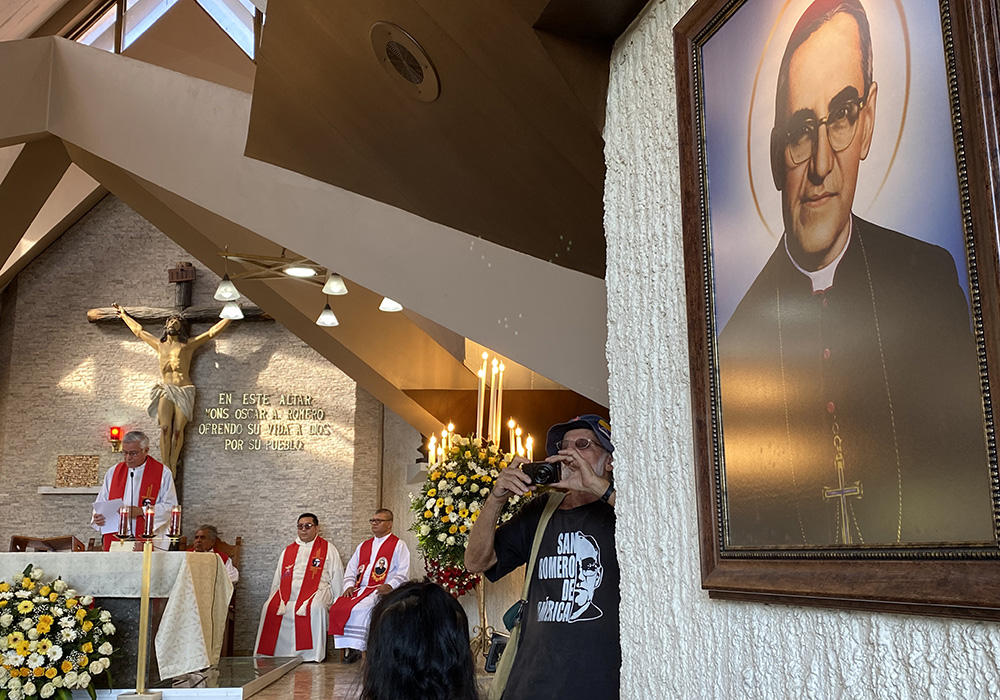
Fr. Juan Vicente Chopin gives a homily at the Divine Mercy Hospital chapel in San Salvador for the March 24, 2023, feast of St. Oscar Romero. Chopin said the Salvadoran bishops have failed to speak against an emergency law that has allowed law enforcement to detain anyone suspected of being a gang member or affiliated with gangs. (NCR photo/Rhina Guidos)
Like the paralytic in the Gospel of John, who couldn't access the healing waters in the pool of Bethesda because he had no one to help him, Salvadoran mothers with sons and daughters in detention must be uttering the same words about their pastors who have remained silent amid their suffering, saying "I have no one," the cardinal said.
More than 65,000 Salvadorans have been detained following the so-called "state of exception" in the last 12 months, according to government figures. In February, officials, including Salvadoran President Nayib Bukele, showed off a new "mega prison" with the capacity to accommodate 40,000 more.
Human rights groups say some of those detained have not committed crimes but have no right defend themselves under the law. At least 80 have died within the last year inside the crowded prisons, they say — the innocent mixed in with gang members. The government regularly publicizes in photos and videos men tattooed with gang symbols cowering in their underwear, a visual manipulation, some say, to justify the measures.
Fr. Manuel Acosta, a professor at the Jesuit-run José Simeón Cañas University in San Salvador, said such images fuel a sense of vengeance that has permeated the hearts of Salvadorans and bishops must also speak against that sense of revenge.
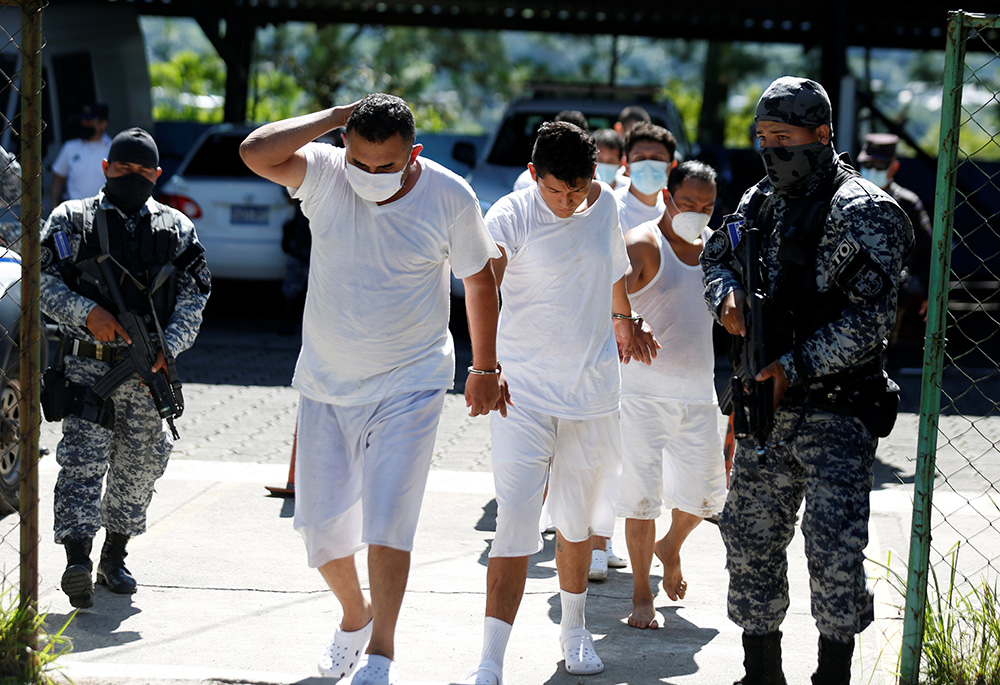
Suspected gang members are presented to the media Nov. 28, 2020, in San Salvador, El Salvador, after being arrested by police during a one-week coordinated law enforcement action with other countries under Operation Regional Shield. In March 2022, Salvadoran President Nayib Bukele suspended some constitutional rights to fight crime, especially gangs. (CNS/Reuters/Jose Cabezas)
"It shakes me to the core to know that we live in a society where revenge is the mechanism for solving social problems, and the church, the bishops, say nothing," he said. "I visit the jails, the prison, and I see the suffering of the prisoners and that is why I speak up. My family members have been murdered by gangs, but I am convinced, from the point of view of the Gospel, that revenge is not the path to peace."
"I am not happy because those who killed my nephews today are being tortured in prison," said Acosta. "No, I'm not happy, no, because that produces more revenge and precisely for this reason, it hurts that the church does not position itself in the preaching that forgiveness is the only path that leads us to national reconciliation."
On the feast of St. Romero, the priest accompanied a group demonstrating outside the chapel where the saint was martyred. They carried photos of their incarcerated loved ones. Most would not provide their names, saying they fear government reprisal.
A woman who would only identify herself as a "desperate mother" pleaded with the president to free her son and brother. Her son was taken from home on Mother's Day 2022, she said, accused, without proof, of "illicit associations." A few months later, her brother suffered the same fate. He was captured after a night of drinking following the death of his mother. The woman said she hasn't seen her son or her brother since their arrests.
"In the eyes of the government, we're all delinquents," she said.
Advertisement
Some prelates, including the cardinal, have spoken against the detentions, but their words have largely gone under the radar. The country's bishops' conference has said little on the topic to the public. The voice that has been heard the most is that of Archbishop José Luis Escobar Alas, who occupies Romero's former seat as the leader of the church in San Salvador. He has said in press conferences that people, by and large, are happy with the state of exception and they have told him they feel safer.
And he's not wrong. Polls show that the majority of Salvadorans, particularly the poor who have suffered extortion on a daily basis and have lived for decades terrorized by gangs, overwhelmingly favor the law – until they're affected by it. Some say it's better to live without the rights the government has stripped them of than the terrorism of the gangs, though many are not aware that the law has eroded the right to assemble peacefully and allows the government to intercept private communications.
That's what makes the situation particularly troubling, said Acosta, because it's the poor who favor a law they don't understand and are bearing the brunt of it at the same time. Bishops must call for forgiveness, not the vengeance that the government is trying to sell them, he said.
"Missing is the voice of a bishop who says, 'We're going to adopt a line of preaching asking for forgiveness among all Salvadorans.' No bishop is proposing forgiveness in front of a society that is seeking vengeance to deal with the suffering that the gangs have caused," he said.
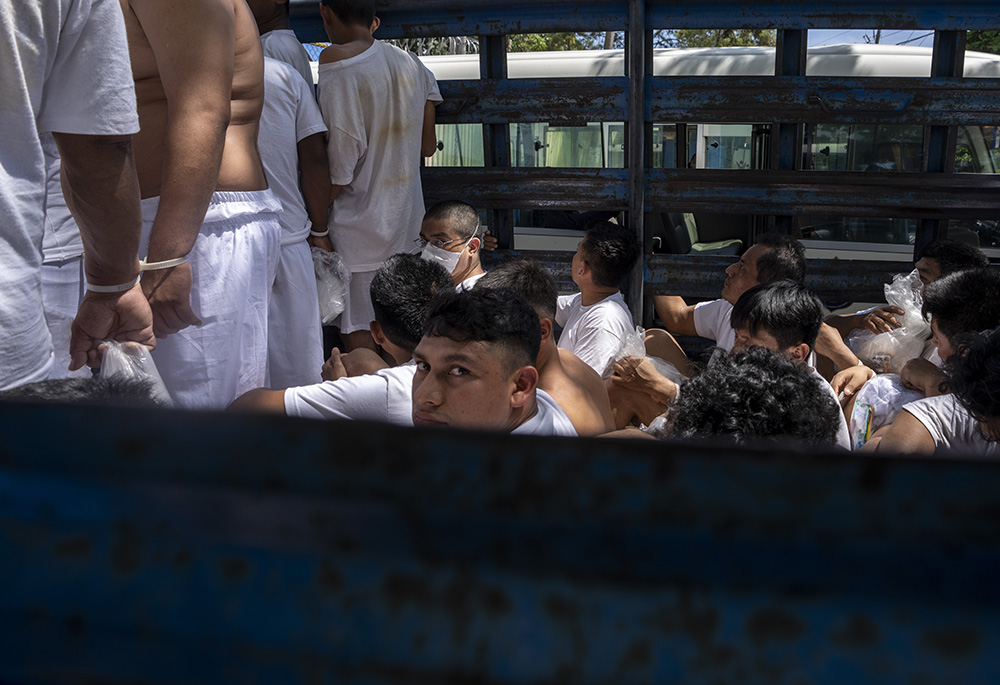
Men detained under the ongoing "state of exception" arrive at a detention center in a cargo truck, Oct. 12, 2022, in Soyapango, El Salvador. The arrests under the "state of exception" have swamped an already overwhelmed criminal justice system, and some defendants arrested on the thinnest of suspicions are dying in prison before any authority looks closely at their cases, according to a network of nongovernmental organizations trying to track them. (AP photo/Moises Castillo)
In a question that seemed posed to his fellow bishops, Rosa Chávez wondered aloud during his homily whether they felt as he does: a sense of sadness, frustration, shame, impotence and guilt. However, he said the government had "never responded" to any petitions made by the body of bishops of El Salvador, and like a lot of groups in the country's civil society "we're like a voice crying out in the wilderness."
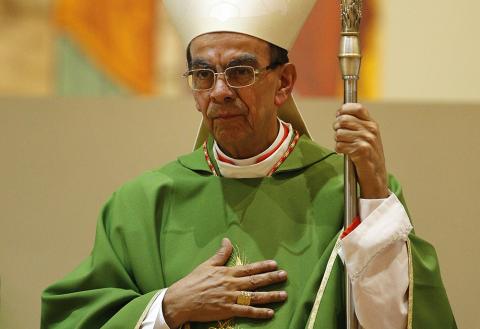
Cardinal Gregorio Rosa Chávez of San Salvador, El Salvador, is pictured in Rome in a July 2, 2017, photo. (CNS/Paul Haring)
He said the sense of shame came from the feeling that a lot of "our brothers and sisters affected by this political situation must feel as if we've failed them, we haven't lived up to Romero's mandate" to accompany and stand up for the poor.
Rosa Chávez, who served as an official in the San Salvador Archdiocese during Romero's tenure and was Romero's friend, said he had been inspired after listening once again to Romero's last call in 1980 to the government, ordering soldiers to "stop the repression" of that time a day before his death. Directing a question to today's government officials, the cardinal asked from the pulpit: "How can you sleep peacefully?"
He said that "many of us have cowered, made ourselves comfortable, silenced ourselves, fallen into indifference. We're like an anesthetized people, comfortable in our small world, enjoying a peace similar to the peace you find in a cemetery."
He pleaded for the intercession of St. Romero.
"Help us take the scales off our eyes," the cardinal asked.








